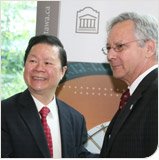
The June 6, 2011, meeting of university senate at the University of Ottawa was remarkable in so many ways. Here are a few.
After a rather lengthy discussion on a motion about whether a correct degree program name in French should be "computer science" or "computer sciences" (plural), the dean of the Faculty of Science, Andre E. Lalonde, boldly displayed independent thinking by being one of only four to abstain from approving the singular version.
Following this and another equally important matter, there was the item of approving yet another two-for-one degree scheme. This one would provide the lucky tuition payer and job-equipped student with both a graduate degree in law (LLM) and a Ph.D. in science (physics was used as the discussion example).
Law professor John Currie had serious reservations and expressed that this plan had never been presented to law professors or to Law Faculty Council or department counsels.
This led student senator Joseph Hickey to state that collegial governance had not been followed. Acting chair of senate Francois Houle countered that collegial governance had been followed because the administration's rules allowed this non-consultation (wow!).
Dean of graduate studies Gary Slater chimed in that the deans of law had approved this and that the (unelected, administration-appointed) deans "represent" the faculty.
Not a single professor rose to the occasion to explaining what the legal term "collegial governance" actually means. Unbelievable.
Collegial governance is on a par with academic freedom as a foundational principle of the modern university in democratic societies and has statutory meaning thanks to decades of labour law precedents and international agreements yet not a single brilliant academic at senate on June 6, 2011, seemed to have any notion of what it means or any problem with completely disregarding it.
The only time collegial governance rights can be constrained is if the collegial body, via the full collegial process, formally agrees by policy to allow the administration to administer some component of collegial governance. The precedents are clear on this point.
It gets better.
Currie explained his reservations, while being apologetic that this might frustrate the administration's efforts.
Currie pointed out that this would be a new scenario in which a student would get a graduate degree in law (with crash courses and without writing a law thesis or research paper) without having an undergraduate degree in law. Currie questioned the value of this LLM compared to real LLM degrees that require an undergraduate law degree and a law research component.
Law professor Currie further pointed out that this would degrade the in-class learning environment where the real LLM students would share classes with the crash-course LLM students having no previous law credentials.
To this Lalonde answered that these new LLM students would be few in number such that the negative impact on the classroom should be minimal, apparently oblivious to the accepted pedagogical fact that a single unprepared student in a class represents a significant operational difficulty for all.
At this point student senator Hickey characterized the plan as "degree inflation". As soon as Hickey uttered these words, Houle cut him off and the motion was tabled until faculty councils could provide their inputs.
There is an obvious (and stated at Senate) push for degree inflation as a way of providing competitive consumer goods to a paying student population eager to dress their CVs for the work market.
Grades inflation was a way to increase student numbers over the last decade and more and these increases were crassly explained and questioned at senate (by biology professor David Currie, quoting previous president Gilles Patry) as the best way to increase the university's income "in order to provide better services for the minority French students"... (quotes as emphasis).
With the help of ace academic architect Slater, degree inflation (e.g., see the remarkable case of the Brand Israel two-for-one LLMs) is now in full swing at "Canada's university", for the usual corporate executive motive of increasing income and size. Size matters to this institution. Nothing else it appears?
Will the collegial body ever wake up?




2 comments:
Lot's (most?) of US universities are working against thinking for oneself! It seems like real innovations scare the status quo, auto-pilot administrators. Most faculty are too afraid to have an alive thought experience of their own!
This exemplifies how a "watch" monitor such as UofOWatch can expose highly questionable decisions, and reveal how unqualified the vast majority of "senators" are for their positions. IF YOU ARE NOT WILLING TO STAND UP FOR SOMETHING ITS TIME TO STEP DOWN! That means you SENATOR-CHORUS! Hats off to those few senators who are doing their job and voicing their independent views, and shame on those (too many) who have mistaken their mandate as one of being a part of a chorus; to nod their heads when directed.
Post a Comment